



The greatest movie ever made..!
Let's be realistic.
n my opinion it was a great movie with some interesting elements, even though having some plot holes and the ending probably was just too messy and crammed together, but still fun to watch and not your casual movie that is similar to all other ones.
View MoreI have absolutely never seen anything like this movie before. You have to see this movie.
View MoreA minor but charismatic painter dies, and his friends and lovers and family go by train to Limoges for his funeral. There is a lot of bitterness and regret and desire: sometimes sudden and apparently irresistible, and it's given a very warm and lovely treatment here. The beauty of the men and their desire for each other is attractive (one does not have to be gay, though it helps to be sympathetic). However, the whole complicated story seems to me to be soaked through with the glum assumption that everything, everything is expendable, and the only good to be achieved is in brief moments of passion, and passion inevitably fades. There is no point in holding on to anyone. Is this apotheosis of fickleness strictly a gay theme? Certainly not, but it is central here. Apparently critics have talked of something being reborn in the story, but I could see only sadness. Happy endings may often be contrived, but sometimes I suspect the ineluctable dissolution ending can be just as contrived. Perhaps I just don't get it, but all this short-term loving, this coming close only to be set drifting outward into darkness seems unnecessarily painful, and I resent being told that's the way it is.
View MoreWow, what was this about? I rented this film with no knowledge of plot, characters, actors, directors, anything. All I knew was it was filmed in France, with English subtitles, was contemporary and had a gay plot or subplot. As I write this it occurs to me that I must have liked it. I love to critique film, yet unless I am moved, emotionally or psychologically, I rarely want to write down why, or how, a film has affected me. This film affected me. ...........................SPOILERS AHEAD........................ Let's start with the basic plot line. A rather minor painter in Paris has passed away and has asked to be buried in his old home town of Limoges in the south of France. 14 of his old friends, relatives, lovers and hanger-ons board a train in Paris early in the morning for a few hours ride to the funeral. The painters body is not on the train but is being driven down in a Pugoet station wagon. They all meet up at the cemetery where a man reads a poem in English and one of the lead male characters translates into French. Men and women standing around the grave cry openly. The majority of the mourners end up at a huge French chateaux for a wake. There, over the next 12 hours or so, everyone engages in a nonstop bitch about sex, money, relationships, marriage, children, love and inheritance, not in that order, but all subjects are covered by everyone by the next morning. Now.....What was this film about? It took viewing through the first hour of this 2 hour film for me to realize that many of the men were gay or bi-sexual and had been lovers of the now dead minor painter. Now I know that Europeans, and particularly the French have always been more accepting of same gender love, but what took me so long to get a handle on what was happening in this film was the way that homosexuality was being portrayed. It was taken as almost natural that most of these guys had been a part of the painters life at one time. Not only natural, but simply "the way it was". There was no censoring "gay" as evil or a perversion. That really did not exist. They had all loved the dead man and they were all grieving for him in some manner. What about the women in this film? Other than some older female relatives and two younger women, most of the characters were men. Is it intimated that these women had been lovers of the painter? This is not clear, however, more unusual is the fact that these women have been either lovers or wives of some of the guys who are mourning for their dead lover, the painter One of the male characters, the one who drove the body down from Paris, is married and his wife and child are on the train to Limoges with everyone else. They go to the funeral and the wake. When her husband is driving the body down to Limoges the guy picks up a hitchhiker and uses him as a sounding board to verbalize his grief over the dead painter. He says something like, " I carried him around, washed his body, worshiped him" Does his wife know of his relationship with the dead guy? Did she approve? What is that all about? There is another character who falls in love with a very cute dark haired guy he meets in the railway station as everyone is boarding the train in Paris. They catch an erotic "squeeze" in the trains toilet. Suddenly you are introduced to a woman who is the older guy's wife? Lover? Old girlfriend? She is very upset. Is she upset over his relationship with the young boy, or is she angry about something else? Yet another male character is gay and he drops his hold on the older guy who loves the young boy. I assume because he wants them to happy together, but without him. To top all this off there are old aunts and, I think, fathers and other people who have something to do with the dead painter, but whose role in all this drama isn't clear. Finally there is the transsexual Viviene. She used to be Frederic, and sill has Fred's equipment, but with boobs as well. Did Frederic have a relationship with the dead painter to? I don't know. Viviene's role in this film is also unclear, yet she seems deliciously happy that no one at the funeral and wake has figured out that she used to Fred. So you see this film is extraordinarily complex. I said it affected me and I was not quibbling about that. I will watch this film again (not tonight!). It stupified me. The negative about this film, from an American point of view, is, of course, the beautiful French language that I don't understand. I know the intricacy and double meaning that the French can put into dialog, and I'm sure the translation into English subtitles butchered some, if not a lot, of the meaning of the interplay between characters. Also, the subtitles themselves were small and in white, not yellow, as they should have been making it very difficult to read and understand. Other reviews have mentioned the darkness of the film. I found that not distracting at all. Many of the sequences in the chateaux are dark to fit the sometimes bizarre and somber storyline. Others were emotionally head on perfect. The crowded, speeding train with claustrophobic atmosphere, carrying all the former lovers and friends, hurtling south across the French country side so they may have a last goodbye. The cemetery, huge, with 180,000 dead souls in the bright sunlight. All filled up to the brim with symbolism and portent. This film is a strange one. Wonderful acting, really top notch all around. The camera work is unique and very stylish. The camera floats along at times, sometimes delivering very long, hypnotic track shots. Sometimes the camera is in a helicopter or plane and the sweeping shots of the city of Limoges and the cemetery are very arresting. Most of the scenes in the rest of the film were shot with a hand held camera and cameras. This gave the film an aura of gritty realism and was not the least distracting. I'd have to say the film is strangely Robert "Altmanish" in texture and characterization. In fact, this film would have been more powerful with a deeper insight into all the characters involvement with the dead painter. Altman would have shot enough for another hour, or longer. It would have been just a little easier to understand all the intense emotions and motivations. But, This was not an Altman film. It was a very unique and off beat art film that I will watch again to see what I missed. Don't buy it, rent it, it makes you think. Isn't that what good drama on film is supposed to do? I liked it and recommend it to anyone who loves different and interesting cinema.
View More*****- Unmissable ****- Very Good ***- Average **- Poor *- RubbishI enjoyed this film because i start my review of it. The beginning was very touching in which we here an interview as a voiceover this is effective. In the title of the film "Those who love me can take the train" the most important word is love. This film goes to show what real love is. The love is on two levels, one part is the love for this man who has died and the other is what happens after the death. The idea of a train being a way of expressing there love is clever. If you think about. Some of the one-liners in this film are quite good. There is also the scene in which a relative reads out a funeral speech which is then tra*nslated into french. That is very clever. There is a lot of emotional depth to this film. I feel the film however looses it slightly with repetitive dialogue in the last half an hour. I do think the transexual is a very important and effective character in plot, as she helps us to understand about how love can change towards someone when they are something different.****/*****
View MoreNo recent film starts better than this one; it out-Altmans Altman with its stunning fragmented introduction of a large cast in a confused situation as they hurriedly board the train taking them away to the funeral in the provinces. It's even helped for an Anglo-Saxon audience in that we don't know who the hell any of these French actors are. (But aren't they terrific?) The first 45 mins or thereabouts are a breathtaking hand-held roller-coaster ride more exhilarating than... well, than more or less anything you can think of. Unfortunately the train journey ends, and we settle down into another hour of vie de chateau banalities, in one of those big old houses no-one can afford to light properly. All of the usual plots raise their tired old heads: gay and straight infidelities, dotty old women and sinister old men, ravishing rent boys with HIV, abortion, drugs, inheritances, you name it and who cares? To cap it all when the missing guest finally arrives, as he was bound to - guess what? He's transgendered. Please!!! As a film director Chereau is every bit as astounding as he used to be working on stage. Please though, Patrice - try working with a script next time. (I know, there's been a next time already, and 'Intimacy' is just about opening in London, vastly famous already for 10 seconds or something of non-simulated heterosexual oral sex. I can wait.)
View More